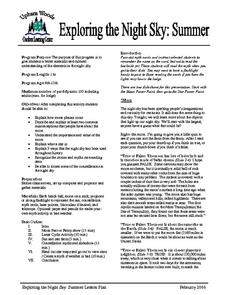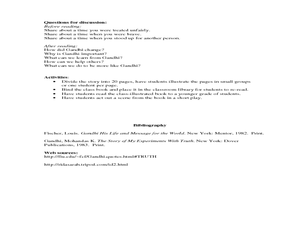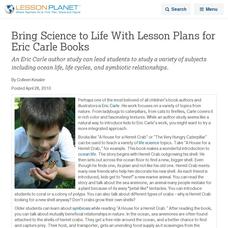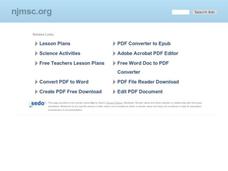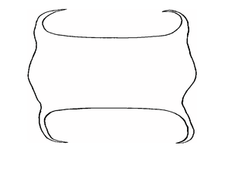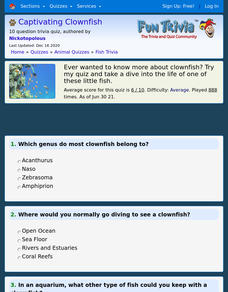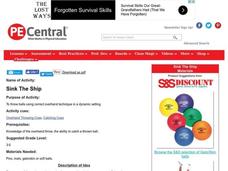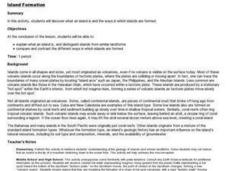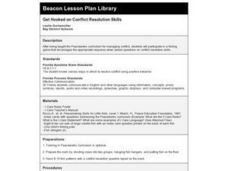Curated OER
Exploring the Night Sky: Summer
Students explain how moon phases occur. They describe and explain at least two common misconceptions that people have about the moon. Students explain what a star is. They explain 3 ways that the night sky has been used throughout history.
Curated OER
Mohandas Gandhi: Changing the World One Step at a Time
Students illustrate pages of a book. In this famous historical icon lesson, students are read a story about Mohandas Gandhi, illustrate the pages in small groups, assemble a class book to read to younger students, and act out a...
Curated OER
Catapults
Students discover the catapult. In this catapult instructional activity, students research the history of the catapult and how it works. They work in groups to build their own catapult using tootpicks, popsicle sticks, rubber bands, and...
Curated OER
Reading Satellite Images
Students analyze satellite images. In this astronomy lesson, students examine 3 satellite images in order to understand how satellite images are taken and what they can teach scientists.
Curated OER
Math in Science-The Pressure is On
In this pressure worksheet, students find the pressure of objects using the equation for pressure. They find the pressure of air in the atmosphere and the pressure of water in the ocean at different depths.
Curated OER
Limestone Reactions
In this limestone reactions worksheet, students read about the various types of limestone reactions and complete a diagram of deposits in a cave. They answer two questions about limestone reactions.
Curated OER
Bring Science to Life With Lesson Plans for Eric Carle Books
An Eric Carle author study can lead students to study a variety of subjects including ocean life, life cycles, and symbiotic relationships.
Curated OER
Skates
Students gain understanding of structure, characteristics, and basic needs of living things and their role in world, identify parts of skate, observe details of skate's body and skate egg case, and identify unique characteristics of skates.
Curated OER
Leaving Home
Learners explain the importance of larval dispersal and retention to populations. They collect data on organisms and examine it.
Curated OER
Estuarine Currents
Students explore an estuarine system to gather data on density driven currents. This type of current is contrasted with temperature and wind driven currents.
Curated OER
Captivating Clownfish Quiz
In this online quiz worksheet, learners answer a set of multiple choice questions about clownfish. Page includes links to answers and resources.
Curated OER
Chart Interpretation
Students study the use of a nautical chart and how to obtain information from it. They describe and differentiate the basic topographic characteristics of a chart and demonstrate the use of nautical tools used to plot fixed points on a...
Curated OER
Life is Weird
Students study the organisms that are found in cold seeps and see how they interact with each-other. In this biological organism lesson students describe the major features of cold seeps and the process of chemosynthesis.
Curated OER
Sink The Ship
Young scholars throw balls using correct overhand technique in a dynamic setting.
Curated OER
Locating Vent Fields Using CTD Data
Students describe the way hydrothermal vents work. Students work on locating vent regions through remote collection of data about water temperature and density. Comparing density and temperatures graphs, students search for indicators...
Curated OER
United States Map- Land Elevation
Students explore a physical map. In this map skills instructional activity, students discuss examples of elevation and investigate the symbols used to identify elevation on a map. Students use the map to identify various land elevations.
Curated OER
TAKS Quiz-Meaning Based on Context
In this TAKS quiz activity, students take an online quiz focused on meaning based on context. Quiz may be graded online by clicking a link.
Curated OER
Island formation
Young scholars explain what an island is, and distinguish islands from similar landforms. They compare and contrast the different ways in which islands are formed.
Curated OER
Making soap you can use
Those textbook experiments are no good. Using this simple method you can make a real bar of soap. It's
Curated OER
The Vast Ocean
Young scholars explore oceans, and demonstrate reading comprehension skills, including reading strategies, inference, literal meaning, and critical analysis.
Curated OER
Get Hooked on Conflict Resolution Skills
Pupils discuss strategies for solving conflicts and acting as peacemakers. They answer questions regarding conflict resolution skills in a fishing game, and respond to a conflict in a written journal entry.
Curated OER
Dark and Beautiful Caves
Students research how caves form. They describe the major stone formations in caves by taking notes. They construct a clay model of a cave and mark each formation making it easy to identify in the legend.
Curated OER
Reading Maps of the East Pacific Rise
Students make qualitative and quantitative observations and use various maps to investigate the features of the East Pacific Rise The study actual bathymetric maps of the EPR region. They identify key features of the ridge and explore...
Other popular searches
- Sea Floor Topography
- Sea Floor Diagram
- Sea Floor Mapping
- Sea Floor Sediment
- Sea Floor Features
- Sea Floor Bathymetry
- Sea Floor Drilling
- Sea Floor Bathmat
- Sea Floor Spread
- Convection Current Sea Floor
- Mapping the Sea Floor
- Sea Floor Mappng
